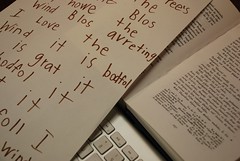New media technologies are transforming the practice of education, and our practices of education must change in the wake of the emergence of new media technologies.
In this presentation, I discuss how new media literacies can be cultivated in students, faculty and staff in ways that deepen our understanding of the world, the university and the community of education in which we live.
Focusing on some the initiatives we have adopted in the Liberal Arts Undergraduate Studies office, I point to concrete examples of how new media literacies are empowering students to critically reflect upon their undergraduate experience. In the process, they are learning, and teaching us, about the educative power of the social web.
Here is the YouTube video of the presentation itself:
Traditional and New Media Literacies on Prezi
During the discussion after the presentation, a number of people asked for the link to my rubric for blogging: The scoring rubric by Christopher Long for blogging.
Finally, I include here an embedded YouTube playlist that includes all the videos I discuss in the presentation. The videos include testimony from students as to how their engagement with social media on our site has enriched their education.


http://www.nytimes.com/2010/11/17/arts/17digital.html?hp
what is the basis for “human-life-in-common”? is this more than human interactions?
Thanks, as always, dirkusa, for the link and for the question. It is, of course, a difficult one insofar as it requires much more than haphazard human interactions. Part of what I am trying to think about is how to cultivate the ability to cultivate meaningful interactions, ones in which meaning itself is at stake.
Human-life-in-common has to remain a question that is permitted to inform our relationships with one another in the various modes in which that communication happens. This is only the beginning of a response, because the basis for “human-life-in-common” is a willingness and ability (both) to interact, to act together, in ways that are animated by your question itself: how can we together enact a meaningful life oriented toward and by a concern for the good of the whole?
very good, it sounded in your lecture as if this was some-thing that already existed as opposed to, as I now understand you to be saying, being something to be achieved, but still I wonder about the possibility of actual “whole(s)”, as opposed to focusing on the evolving particular problem/means/people/desires at hand.
http://onthehuman.org/2009/06/biopower-dignity-synthetic-anthropos/
ps. something like an ethnographic account of how you manage the transition of the philo dept (and others in the humanities) into the digital age would be most instructive, especially how their training/expertise does or does not lend itself to such a process.